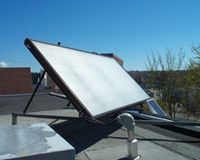 People on my renewable energy beat are buzzing today over word that Tioga Energy has made its Power Purchase Agreement “open source.”
People on my renewable energy beat are buzzing today over word that Tioga Energy has made its Power Purchase Agreement “open source.”
That's right. They haven't.
The contract is not being offered under any recognized open source license. It's just been posted to the Web, with some boilerplate in front of your download noting that Tioga is not responsible for your use of the SurePathSM Solar Power Purchase Agreement ("PPA").
Fair enough. But it's a good first step.
 What they should be doing is putting it under a Creative Commons license. Share, reuse, remix legally – that's the idea they're going for. But many people, even lawyers, don't understand these niceties, and if they want to claim they're “open sourcing” the agreement people may choose to understand it that way.
What they should be doing is putting it under a Creative Commons license. Share, reuse, remix legally – that's the idea they're going for. But many people, even lawyers, don't understand these niceties, and if they want to claim they're “open sourcing” the agreement people may choose to understand it that way.
Now let me explain why how to make this a Really Good Thing.
 PPAs are a pretty standard concept in the solar industry. They are a way to finance solar panels. You agree to buy the power produced by the panels, at a fixed price, over a fixed term, and this generates enough money to pay for the panels. You, the building owner, don't have to take legal responsibility for the panels themselves – the installer does. It's a lease.
PPAs are a pretty standard concept in the solar industry. They are a way to finance solar panels. You agree to buy the power produced by the panels, at a fixed price, over a fixed term, and this generates enough money to pay for the panels. You, the building owner, don't have to take legal responsibility for the panels themselves – the installer does. It's a lease.
The idea is that the money you save on your energy bill from this PPA, plus the cost of electricity under the PPA, should be less than your current electric bill. If the numbers work (and it sort of depends on how much Sun your roof gets – I have trees all over mine) then everyone makes out.
The problem is that laws differ so much across jurisdictions in this country that customizing a PPA to every case becomes a significant cost. It can even cause some deals to swing from profit to loss. When legal costs are getting in the way of doing profitable business, they need to be cut.
Offering the PPA to the rest of the industry is a step in that direction. But it's only a step. Here are some ideas that can make this even more “open source-y” and deliver Tioga the value it's seeking:
-
Launch this license as a formal project. Create a foundation to solicit contributions for its maintenance.
-
Register the document through Creative Commons.
-
Start a Wiki so people can discuss the document and add their suggested changes.
-
Monitor the use of the document in every state, county or city. Track changes made to the document to fit the legal environment of each jurisdiction.
- Create a software program that will let people plug in a state and county, then get a copy of the agreement customized for that jurisdiction. That's software you can open source.
What Tioga wants to do is start down the road toward a standard contract that can be used by everyone in the industry. Very admirable. But it's not as simple as throwing your own contract onto the Web. If they want to get serious about the process, they could dramatically extend the work of open source.
Because after all, if we can come up with a standard for this kind of contract, why not others?









